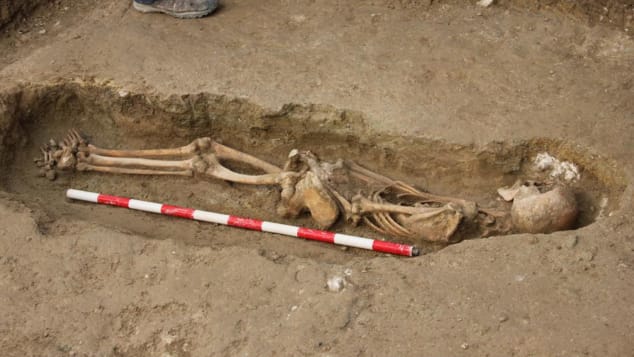Archaeologists find sealed sarcophagi in Egypt 0:51
(CNN) -
An ancient Islamic necropolis containing more than 4,500 bodies has been discovered in northeastern Spain.
Archaeologists excavated more than 400 tombs at the 20,000-square-meter site.
The graves were discovered in an 8th-century cemetery in the town of Tauste, near Zaragoza in Aragon, Eva Gimenez, an archaeologist who is currently excavating the area with the archeology firm Paleoymás, told CNN.
Around the year 711 d.
C., the Arab forces had invaded and begun to conquer the Iberian Peninsula.
They remained for the next seven centuries until 1492, when the area was fully reconquered by the Christian kingdoms.
The Muslim occupation of Tauste had been considered "incidental and even non-existent" by traditional and written sources, researchers from the University of the Basque Country have said.
But the region's cultural association had long suspected that the area had been home to a large Islamic settlement due to architectural clues and human remains found in the city, Miriam Pina Pardos, director of the Necropolis Anthropological Observatory, told CNN. Islamic of Tauste of the Cultural Association El Patiaz.
Mexican archaeologists identify the first Mayan slave ship discovered
Previous excavations revealed several skeletons at the site. (Credit: El Patiaz Cultural Association)
From 711 to 1492, the boundaries between the Christian north and the Islamic south constantly changed with the change of sovereign authority, according to researchers from the University of the Basque Country.
advertising
A first excavation of the site, in 2010, revealed a five-acre necropolis, spread over at least two levels, Pina Pardos said.
Archaeologists find traces of an Iron Age massacre in Spain
Islamic tombs in Spain
DNA and carbon dating studies place remains in the necropolis between the 8th and 11th centuries, according to El Patiaz.
Some 44 skeletons were discovered during smaller excavations in the years after the initial excavation, Pina Pardos said, and this year, more than 400 skeletons have been found after local authorities ordered an extensive excavation in the area.
“It is rare to do an excavation and find 400 graves.
It's amazing, ”he said.
All the skeletons had been buried in accordance with Islamic customs, placed on the right and facing southeast towards Mecca, added Pina Pardos.
Experts say the remains had been buried according to Islamic customs (Credit: El Patiaz Cultural Association)
Experts believe that the discovery will challenge previous assumptions about Muslim settlements in the area.
"We can see that the Muslim culture and the Islamic presence in this area is more important than we think," said Giménez.
"We can see that there was a large Muslim population here in Tauste since the beginning of the presence of Muslims in Spain," he added.
"It is very important: the 400 Muslim tombs show that people lived here for centuries," he said.
The remains will be cataloged, stored for investigation and studied, said Pina Pardos.
ArchaeologistsIslamism

